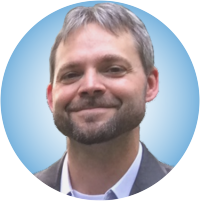 David Mitlyng for Xairos
David Mitlyng for Xairos
We Need to get the Bullseye off GPS
One of the key takeaways from the "Protecting GPS Satellites, Signals, and America" conference last week was that the lack of a GPS alternative invites attack.
China and Russia long ago recognized the world's reliance on GPS, so they built their own independent system.
That they have their own alternatives in place "and the US does not is worse than a critical vulnerability. It actually invites exploitation and attack."
According to the panelists, “We need to get the bullseye off GPS."
And they agree on the way to do this: incentivize private industry to build an alternative.
Last Week's Theme: The Threat is Closer than You Think
- Thank you Colorado! Selected for a $250K Advanced Industries grant meant "to promote growth and sustainability in Colorado’s advanced industries."
- As part of this, engaged with the CUbit Quantum Initiative, a partnership between private industry, the University of Colorado Boulder, and the National Institute of Standards and Technology (NIST) to "build a strong foundation for novel quantum technologies and their rapid dissemination, application and commercialization" and make Colorado "the quantum capital of the world.”
- Presented at the QURECA Quantum Pitch Competition. Thank you Araceli for the opportunity and a fun event!
- Heading to the Bay Area next week for the 2021 Q2B Quantum Start-ups Pitch Session. Drop us a line if you are interested in meeting!
- Prepping for the next CDL Quantum Stream session.
- Working on National Science Foundation (NSF) proposals with our university partner.
- Attended the Open Compute Project (OCP) Global Summit sessions discussing the importance of timing and synchronization for data centers. Also joined the OCP Time Appliance Project Group.
- Looking ahead to NASA and Defense Advanced Research Projects Agency (DARPA) solicitations.
- New partnerships are in work, including another university Research Collaboration.
2021
- Q2B Practical Quantum Computing, December 7 - 9, Santa Clara, CA
- TC Sessions: Space 2021, December 14 - 15, virtual
2022
- Colloquium on the Physics of Quantum Electronics (PQE 2022), January 10 - 14, Snowbird, Utah
- SPIE Photonics West, January 22 - 27, San Francisco, CA
- Inside Quantum Technology The Hague, February 21 - 23, The Hague, Netherlands
- Quantum Information Processing (QIP 2022), March 7 - 11, Pasadena, CA
- Satellite 2022, March 21 - 24, Washington DC
- Quantum Business Europe, March 23 - 24, location TBD
- IEEE International Conference on Space Optical Systems and Applications, March 28 - 31, Kyoto, Japan
- Space Symposium, April 4 - 7, Colorado Springs, CO
- Workshop on Synchronization and Timing Systems, May 9 - 12, Denver, CO
- Photonics for Quantum, June 6 - 9, Rochester, NY
- Quantum.Tech Boston, June 14-15, Boston, MA
- IEEE Quantum Week 2022, September 18 - 23, Broomfield, CO
- A recent Deloitte report “Chinese Threats in the Quantum Era” highlighted that "beginning in 2016, the nation unleashed a 13-year plan to become a top global innovator in multiple technology areas, including quantum. That led to multibillion dollar investments to enable breakthroughs in the field—and an $11 billion National Laboratory for Quantum Information Sciences."
- China's leading quantum research group and QuantumCTek have been added to a US trade blacklist for "acquiring and attempting to acquire U.S.-origin items in support of military applications". QuantumCTek made the news when it had a record IPO last year.
- Have you ever wanted to spoof GPS? It isn't hard - just check out this presentation by the GPSPATRON CEO at the Kaspersky Industrial Cybersecurity Conference.
The US has designated 16 infrastructure sectors that are considered "so vital to the United States that their incapacitation or destruction would have a debilitating effect."
But, for some reason, space infrastructure is not in this Critical Infrastructure list.
After the Russian ASAT test there is some momentum to change that.
After all, "GPS signals are needed by 13 of the 16 critical infrastructure sectors," according to Greg Winfree, the CEO of the Texas A&M Transportation Institute.
To learn more, please email us or schedule a meeting here.

